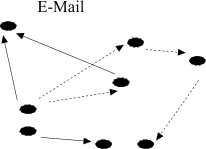

| Traditionally
management development has been a one-off experience. Designed to match key points in the
manager's career, a manager would be 'sent' on a long, 3 to 12 week, course to learn new
knowledge and skills. This long period spent on a course allowed time for new competencies
to be digested and absorbed and often practised. In addition, firm friendships were
established and a network of peers emerged which provided both encouragement and peer
pressure to try out the things learnt once the participants returned to the workplace.
|
 |
|
| Today two major obstacles
prevent us from relying on long periods away from work and the workplace to skill-up our
managers. Firstly, the pressure on time. As organisations have become leaner there is less
opportunity for a manager to be away from the work processes and projects for more than a
few days. This has driven management training events to become shorter and shorter. Much
of the time required to obtain the value of digesting new competencies has been lost.
Furthermore, there is less opportunity for making firm friendships and less time to
understand each other and each other's goals. The support network and peer pressure to
change is lost. At the worst extreme the manager is briefly brought into contact with new
ideas, allowed to show a response and is then moved on. Termed 'sheep dip' training, this
extreme has little or no value.
|
||
| The second pressure encourages
the trend towards sheep dipping even further. Most modern business environments are
intensely chaotic. Change is rapid and new challenges arise daily. As a result, there is a
wider range of skills and competencies to learn. All this in less time. In order to combat
the trends, development courses are moving towards a focus on the manager's actual job
rather than on case histories. At the same time, managers are encouraged to continue the
learning process within the work place during the processes and projects they manage. This
is called Continuous Learning. The demand for
continuous learning is met through open learning centres or courses designed in this mode.
|
||
| When designed in a
continuous learning mode, management development becomes modular and will often include a
support process for interaction during the work focused periods between modules. To achieve this continuous learning, Pentacle The Virtual Business School designs modular programmes and uses collaborative software platforms.
|
||
|
||
| E-mail |
 |
|
| Groupware - collaborative software |
 |
|
|
||
| We have found that
the impact of groupware on the learning process is absolutely phenomenal. The network develops and participants transfer learning into the workplace. Furthermore, the educators can help to develop competencies which are required but were not covered by the original training needs. |
||
Pentacle the Virtual Business School has invented, and leads the world, in the provision of on-line communities for you to join and learn about issues close to your heart - the things which keep you awake at night!
These are available only to people on continuous learning programmes and virtual team members. We only run programmes for organisations.
If you want to discuss your organisation's needs you can e-mail us here.
INVENTING TOMORROW Strategy, Innovation
DELIVERING TOMORROW Programme
Management Project Management Change Management
DELIVERING TODAY Process
Management New World Management
LEADING PEOPLE TO DELIVER Leadership
Virtual Teaming Organisational development
ENSURING RESULTS Making
Money
I'm looking for a shortcut to the New World Pioneer e-clubs
*"Nouvomondism" - The New World business approach was invented by Professor Eddie Obeng (BioNote)
Copyright Pentacle1997 Eddie Obeng 1994 All rights reserved